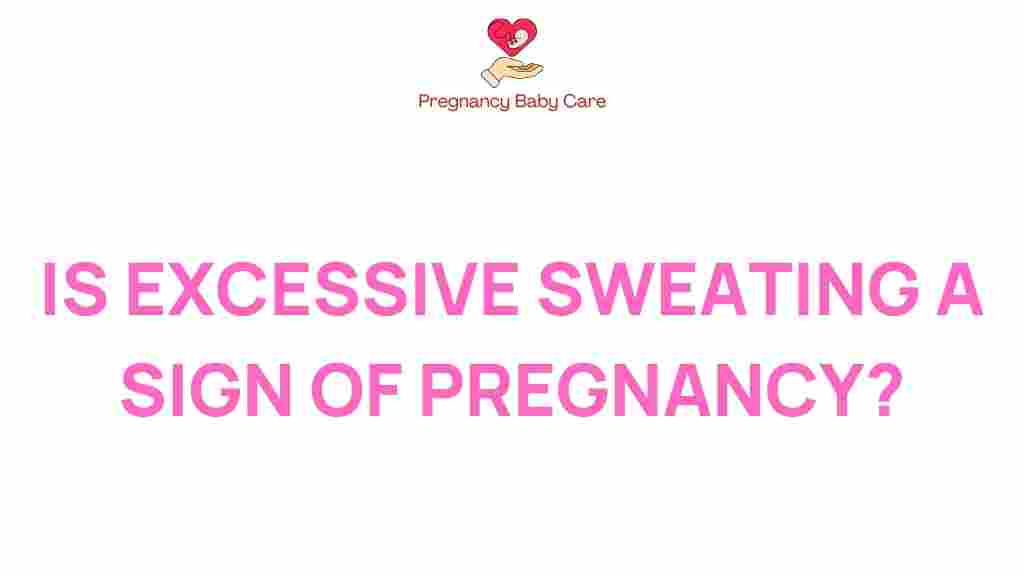Is Excessive Sweating an Overlooked Sign of Pregnancy?
Pregnancy is a transformative period in a woman’s life, filled with numerous changes both physically and emotionally. Among the various pregnancy signs, one symptom that often goes unnoticed is excessive sweating. While many focus on more recognized signs, such as missed periods or nausea, sweating can also indicate the body’s response to the hormonal changes that accompany pregnancy. This article will explore the relationship between excessive sweating, pregnancy, and maternal health, providing valuable insights into this often-overlooked symptom.
Understanding Excessive Sweating
Excessive sweating, or hyperhidrosis, is a condition characterized by an abnormally high level of perspiration. It can occur in various areas of the body, including the hands, feet, underarms, and face. For many individuals, this condition can be frustrating and embarrassing, especially in social situations. However, for pregnant women, the experience of sweating can be exacerbated due to the significant hormonal changes that occur during this time.
The Connection Between Hormonal Changes and Body Temperature
During pregnancy, a woman’s body undergoes a myriad of changes, primarily driven by hormonal fluctuations. The main hormones responsible for these changes include:
- Progesterone: This hormone increases significantly during pregnancy and can raise the body’s overall temperature.
- Estrogen: Levels of estrogen also rise, which can affect how the body regulates temperature and moisture.
- Relaxin: This hormone helps prepare the body for childbirth and can also influence sweat production.
As a result of these hormonal shifts, many women experience an increase in body temperature, leading to excessive sweating. This symptom can manifest in various scenarios, such as during the night (night sweats) or during physical activity.
Early Symptoms of Pregnancy
Excessive sweating can be one of the early symptoms of pregnancy, often occurring alongside other signs. Here are some common early symptoms that may accompany excessive sweating:
- Missed period
- Morning sickness or nausea
- Breast tenderness
- Fatigue
- Frequent urination
- Heightened sense of smell
While excessive sweating is not as well-known as these other symptoms, it can be an essential part of understanding a woman’s unique pregnancy experience.
Debunking Pregnancy Myths Related to Sweating
There are numerous myths surrounding pregnancy, and some may relate to the experience of excessive sweating. Here are a few common myths and the truths behind them:
- Myth: Only overweight women sweat excessively during pregnancy.
Truth: Women of all body types can experience excessive sweating due to hormonal changes, regardless of their pre-pregnancy weight. - Myth: Sweating means the baby is too hot.
Truth: Excessive sweating is primarily a response to the mother’s body adjusting to pregnancy, and it does not necessarily indicate the baby’s temperature. - Myth: Sweating is a sign of dehydration.
Truth: While it’s essential to stay hydrated during pregnancy, excessive sweating is mainly due to hormonal changes rather than dehydration.
Health Insights into Maternal Health
Understanding the implications of excessive sweating in the context of maternal health is vital. Here are some important health insights:
- Hydration: Pregnant women should prioritize staying hydrated, especially if they experience excessive sweating. This helps to maintain healthy body function and supports overall pregnancy health.
- Clothing Choices: Wearing breathable fabrics can help manage excessive sweating. Loose-fitting, natural fibers like cotton can keep the body cooler.
- Consulting a Healthcare Provider: If excessive sweating becomes bothersome or is accompanied by other concerning symptoms, it’s important to consult a healthcare provider for advice and potential treatment options.
Step-by-Step Process for Managing Excessive Sweating During Pregnancy
If you are experiencing excessive sweating during pregnancy, here’s a step-by-step guide to help manage this symptom:
- Stay Cool: Keep your environment comfortable. Use fans, air conditioning, or take cool showers to help regulate body temperature.
- Choose the Right Clothing: Opt for loose, breathable clothing made from natural materials to allow sweat to evaporate.
- Hydrate: Drink plenty of water throughout the day to help regulate body temperature and prevent dehydration.
- Practice Relaxation Techniques: Stress can exacerbate sweating. Consider methods such as deep breathing, yoga, or meditation to help reduce stress levels.
- Consult a Professional: If excessive sweating becomes a significant concern, reach out to your healthcare provider for personalized advice and potential treatments.
Troubleshooting Tips for Excessive Sweating
While the steps above can help manage excessive sweating, here are some troubleshooting tips to consider:
- Track Your Symptoms: Keep a diary of when excessive sweating occurs and any potential triggers, such as food, stress, or environmental factors.
- Avoid Triggers: Identify and avoid known triggers that may worsen sweating, such as spicy foods or highly stressful situations.
- Use Antiperspirants Wisely: Consult with a healthcare provider about safe antiperspirants that can be used during pregnancy.
- Monitor Other Symptoms: Be aware of other symptoms that may accompany excessive sweating, such as dizziness or fatigue, and report them to your doctor.
Conclusion
Excessive sweating is an often-overlooked sign of pregnancy that can stem from the significant hormonal changes occurring in a woman’s body. Understanding this symptom is crucial for maternal health and well-being. By recognizing excessive sweating as a potential early symptom of pregnancy, women can better navigate their pregnancy experience and manage any discomfort associated with this condition.
Pregnancy is filled with myths and misconceptions, but by arming yourself with accurate information and health insights, you can make informed decisions about your health. Always remember to consult with healthcare professionals if you have concerns or questions about your symptoms. For more information on pregnancy health, you can visit this resource.
Ultimately, awareness of excessive sweating and its relation to pregnancy can empower women to take charge of their maternal health during this significant life phase.
This article is in the category Pregnancy and created by PregnancyBabyCare Team
